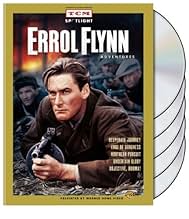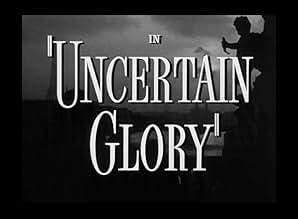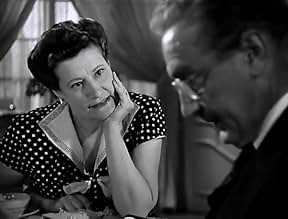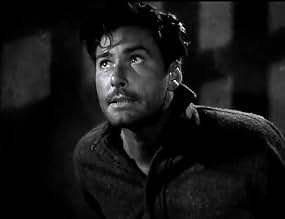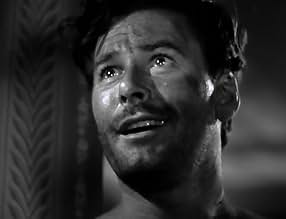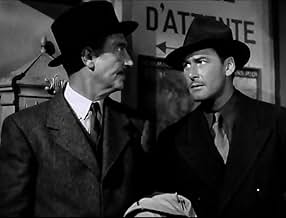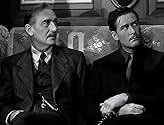ÉVALUATION IMDb
7,1/10
1,5 k
MA NOTE
Ajouter une intrigue dans votre langueAfter a career criminal is recaptured and knows he faces the guillotine, he offers to exchange his life for 100 hostages slated for execution by the Germans.After a career criminal is recaptured and knows he faces the guillotine, he offers to exchange his life for 100 hostages slated for execution by the Germans.After a career criminal is recaptured and knows he faces the guillotine, he offers to exchange his life for 100 hostages slated for execution by the Germans.
Douglass Dumbrille
- Police Commissioner LaFarge
- (as Douglas Dumbrille)
Felix Basch
- Gestapo Major
- (uncredited)
Frederic Brunn
- German Soldier Reporting to Major
- (uncredited)
Nora Bush
- Townswoman
- (uncredited)
James Carlisle
- Townsman
- (uncredited)
Wallis Clark
- Razeau
- (uncredited)
Pedro de Cordoba
- Executioner
- (uncredited)
Fred Cordova
- Execution Guard
- (uncredited)
Histoire
Le saviez-vous
- AnecdotesErrol Flynn was criticized for playing heroes in World War II movies. Tony Thomas in his book 'Errol Flynn: The Spy Who Never Was' states that Flynn had tried to enlist in every branch of any armed services he could but was rejected as unfit for service on the grounds of his health. He had a heart condition, tuberculosis, malaria and a back problem. Flynn felt he could contribute to America's war effort by appearing in such films as Edge of Darkness (1943); Northern Pursuit (1943); Dive Bomber (1941), Aventures en Birmanie (1945) and Uncertain Glory (1944). Reportedly, Flynn was at his most professional and co-operative he ever was whilst working on Second World War movies. The studios apparently did not diffuse the criticism of Flynn's state-of-health as they wished to keep it quiet for fear of his box-office draw waning.
- GaffesAbout 1:20 into the film, there is a scene where the French police are coming into the town at night. One, on a motorcycle, rounding a corner, seemingly slips on the wet cobblestones and crashes in front of the camera - the shadow of his head flashes across the bottom of the screen and the sound of his presumed crash can be heard.
- Citations
Jean Picard: [indignantly to the barber just before he is to be sent to face the guillotine] My head comes off as it is!
- ConnexionsFeatured in The Adventures of Errol Flynn (2005)
- Bandes originalesLa Marseillaise
(1792) (uncredited)
Music by Claude Joseph Rouget de Lisle
Variations in the score often
Commentaire en vedette
Uncertain Gory is a thoughtful, well-made war/intrigue thriller staring Errol Flynn and Paul Lukas. Flynn, whose acting skill was oft unfairly derided as suitable only for swashbuckling, athletic roles, could have easily let himself be overshadowed by Lukas, a high-class dominant character actor known for his acerbic, psychological portrayals. In fact Flynn seems to have been inspired by his co-star and turns in what may have been the best acting job of his career.
While Flynn usually played the dashing hero, and Lukas was often cast in sinister roles, here the roles are reversed. Lukas portrays an upright police inspector escorting scummy lifelong criminal and convicted murderer Flynn through Nazi-occupied France to face the guillotine. As the Germans are preparing to execute a hundred French hostages unless the saboteur who blew up a bridge with a German troop train on it surrenders himself, Flynn suggests he could end his misspent life with a noble gesture by claiming to be the saboteur. He would rather be executed by firing squad anyway, he avers, than face the awful prospect of beheading. Against his better judgment, the inspector agrees. The complications and suspense hereafter hinge on whether consummate conman Flynn is sincere, or is he working the con of his life -- for his life. The ensuing cat-and-mouse game between the wily criminal and the determined, suspicious policeman provides an entertaining, suspenseful story and a pair of brilliantly realized character studies by Flynn and Lukas. Along the way, the criminal picks up the help of a naive, provincial shop girl, Jean Sullivan, a pretty, lithesome flamenco dancer, brilliantly cast in her introductory movie roll. Part of the suspense turns on whether Flynn actually loves the girl or is just using her.
Director Raoul Walsh has cinematographer Sid Hickox use many closeups to catch every nuance of facial expression in constructing deeply psychological and spiritual character studies. As in all Warner Brothers pictures of this era, the marvelous supporting cast sports many familiar and expressive faces. Lucille Watson plays her usual nasty matron as the bitter, manipulative mother of one of the hostages. Faye Emerson sizzles as one of Flynn' hard-bitten molls in the early going. James Flavin, almost unrecognizable in a black mustache and an Adrian helmet, turns in his typical stolid, authoritarian presence in a typically thankless roll as a harried militia captain feverishly searching for the saboteur. But Dennis Hoy is absolutely riveting as the parish priest. He is like Moses come down from the mountain as he roundly denounces as sinful and demoniacally inspired the plans of Watson and confederates to free their loved ones by fingering and innocent man as the saboteur. He is more quietly moving as he asks his congregation to kneel and beg God's forgiveness for their sins and the sins of their country which have caused them to be delivered into the hands of the enemy they hate.
Herein is the aspect of this picture different from what one sees throughout most of the classic movie era or any other time. Characters routinely pray and invoke the help of God, and there is much philosophical talk of God. Though ridiculing and joking at the time, Flynn's decadent thief is seen to be visibly moved as he watches tough cop Lukas kneel to pray in the church they have entered to avoid the Nazis and their Vichy militia toadies. We never know what Lukas is praying for -- his family in Paris? the success of their perilous scheme? forgiveness of his sins? -- but we are moved. At least those of us who are Christians are. Likewise as the escaped Flynn watches old people praying in a farm yard for the deliverance of the hostages and his innocent girlfriend lighting a candle for the same blessing. Such scenes were seldom seen in the l930's or the later 1940's. Hollywood was happy to forget God most of the time. Most of the rest of us are, too, until we start having troubles. World War II was a time of deep, deep, dark, dark troubles for the whole world. So Hollywood, like everyone else, except perhaps the most die-hard of commies, was remembering God. As soon as the war was over, and brighter times returned, God was promptly forgotten again.
Those hoping for a rat-a-tat-tat war action movie will be disappointed by Uncertain Glory. There is little action, though much suspense. This is more of a thinking person's Errol Flynn picture. It may be too philosophical and too Christian for some, but it should be rewarding in any case for the intense, psychological character studies by Flynn, Lukas, and the sterling supporting cast. A fine moral-boosting World War II piece, and top grade Old Hollywood entertainment from "the best of times and the worst of times."
While Flynn usually played the dashing hero, and Lukas was often cast in sinister roles, here the roles are reversed. Lukas portrays an upright police inspector escorting scummy lifelong criminal and convicted murderer Flynn through Nazi-occupied France to face the guillotine. As the Germans are preparing to execute a hundred French hostages unless the saboteur who blew up a bridge with a German troop train on it surrenders himself, Flynn suggests he could end his misspent life with a noble gesture by claiming to be the saboteur. He would rather be executed by firing squad anyway, he avers, than face the awful prospect of beheading. Against his better judgment, the inspector agrees. The complications and suspense hereafter hinge on whether consummate conman Flynn is sincere, or is he working the con of his life -- for his life. The ensuing cat-and-mouse game between the wily criminal and the determined, suspicious policeman provides an entertaining, suspenseful story and a pair of brilliantly realized character studies by Flynn and Lukas. Along the way, the criminal picks up the help of a naive, provincial shop girl, Jean Sullivan, a pretty, lithesome flamenco dancer, brilliantly cast in her introductory movie roll. Part of the suspense turns on whether Flynn actually loves the girl or is just using her.
Director Raoul Walsh has cinematographer Sid Hickox use many closeups to catch every nuance of facial expression in constructing deeply psychological and spiritual character studies. As in all Warner Brothers pictures of this era, the marvelous supporting cast sports many familiar and expressive faces. Lucille Watson plays her usual nasty matron as the bitter, manipulative mother of one of the hostages. Faye Emerson sizzles as one of Flynn' hard-bitten molls in the early going. James Flavin, almost unrecognizable in a black mustache and an Adrian helmet, turns in his typical stolid, authoritarian presence in a typically thankless roll as a harried militia captain feverishly searching for the saboteur. But Dennis Hoy is absolutely riveting as the parish priest. He is like Moses come down from the mountain as he roundly denounces as sinful and demoniacally inspired the plans of Watson and confederates to free their loved ones by fingering and innocent man as the saboteur. He is more quietly moving as he asks his congregation to kneel and beg God's forgiveness for their sins and the sins of their country which have caused them to be delivered into the hands of the enemy they hate.
Herein is the aspect of this picture different from what one sees throughout most of the classic movie era or any other time. Characters routinely pray and invoke the help of God, and there is much philosophical talk of God. Though ridiculing and joking at the time, Flynn's decadent thief is seen to be visibly moved as he watches tough cop Lukas kneel to pray in the church they have entered to avoid the Nazis and their Vichy militia toadies. We never know what Lukas is praying for -- his family in Paris? the success of their perilous scheme? forgiveness of his sins? -- but we are moved. At least those of us who are Christians are. Likewise as the escaped Flynn watches old people praying in a farm yard for the deliverance of the hostages and his innocent girlfriend lighting a candle for the same blessing. Such scenes were seldom seen in the l930's or the later 1940's. Hollywood was happy to forget God most of the time. Most of the rest of us are, too, until we start having troubles. World War II was a time of deep, deep, dark, dark troubles for the whole world. So Hollywood, like everyone else, except perhaps the most die-hard of commies, was remembering God. As soon as the war was over, and brighter times returned, God was promptly forgotten again.
Those hoping for a rat-a-tat-tat war action movie will be disappointed by Uncertain Glory. There is little action, though much suspense. This is more of a thinking person's Errol Flynn picture. It may be too philosophical and too Christian for some, but it should be rewarding in any case for the intense, psychological character studies by Flynn, Lukas, and the sterling supporting cast. A fine moral-boosting World War II piece, and top grade Old Hollywood entertainment from "the best of times and the worst of times."
- oldblackandwhite
- 27 févr. 2012
- Lien permanent
Meilleurs choix
Connectez-vous pour évaluer et surveiller les recommandations personnalisées
- How long is Uncertain Glory?Propulsé par Alexa
Détails
- Durée1 heure 42 minutes
- Couleur
- Rapport de forme
- 1.37 : 1
Contribuer à cette page
Suggérer une modification ou ajouter du contenu manquant



